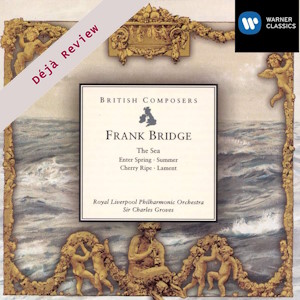
Déjà Review: this review was first published in September 2003 and the recording is still available.
Frank Bridge (1875-1941)
The Sea – Suite for orchestra (1910)
Summer – Tone Poem (1914)
Cherry Ripe (1916)
Enter Spring – Rhapsody (1927)
Lament (1915)
Royal Liverpool Philharmonic Orchestra/Sir Charles Groves
rec. 14 & 15 July 1975, Philharmonic Hall, Liverpool , UK
Originally reviewed as EMI 5668552
Warner Classics 5668555 [60]
These recordings, in their original LP incarnation, were the first of music by Bridge that I ever bought. It was actually The Sea that I wanted to acquire, having heard a performance on the radio, but all the rest of the music, then completely new to me, proved to be well worth getting to know. In those days (1976) there was very little of Bridge’s music available on record. Over the intervening years that has changed and there is now a good selection of recordings available. The Sea, in particular exists in a number of fine performances by conductors of the stature of Vernon Handley, Richard Hickox and by Bridge’s most famous pupil, Benjamin Britten (a live performance on BBC Legends). Britten’s disc also includes Enter Spring and Hickox has also done that work for Chandos, albeit on a separate CD. However, revisiting these Groves performances I was delighted to find that they have stood the test of time very well.
The Sea is probably more immediately approachable than the other two major works included here but that does not make it any less rewarding. Indeed, it seems to me to be a very successful and atmospheric evocation of the various “moods” of the sea. Right at the start the swelling chord followed by the undulating theme on lower strings is highly suggestive and this is but one of many touches of high-class orchestration to be found in this work. Bridge need not fear comparison with Britten or Debussy The thematic material is also interesting and appealing. Aided by fine, committed playing from the RLPO and a wonderfully rich, red-blooded EMI recording (typical of them at this period) Groves imparts the atmosphere of all four movements extremely well. Comparing him with Britten (live in The Maltings at the 1967 Aldeburgh Festival) I find that Groves is, for example, a little richer in tone at the start of the third movement but there’s little in it. Hickox, of course has the benefit of a sumptuous 2001 Chandos recording and so his version inevitably registers more detail than his rivals. In the fourth movement Britten whips up the most tempestuous storm of all and, all in all, I thought that by a whisker his reading conveys the most in terms of the tang of the sea – after all, he lived by the seaside for years. But it’s a very close thing and no one buying this Groves performance is likely to feel short-changed at all.
Summer is a fine work in which Bridge conjures up the warmth of a “traditional” English summer day. (I’m quite sure he didn’t have in mind the oppressive humidity that we’re currently “enjoying” in July 2003 in England.) As Anthony Payne aptly puts it in his notes “over all there lies a lazy warmth and sometimes a mystery that never fails to haunt the listener.” Groves paints the picture for us very well and gets some extremely responsive playing from his Liverpool band. They also play both of the shorter pieces extremely well. No mere “fillers” these, especially the touching and sincere little Lament!
What an extraordinary work is Enter Spring, which is by some distance the latest work in this collection. It was composed after Bridge’s style had undergone a transformation in the aftermath of World War I, becoming much more complex and harmonically unstable. Bridge’s masterpiece (for such it surely is) is a Dionysian evocation of the annual re-creative power of Spring. In fact, though the musical styles are light years apart I’d liken it in this respect to the first movement of Mahler’s Third Symphony, which is another glorious, hedonistic celebration of nature. The piece teems with invention and detail and Groves and his players rise to the challenge wonderfully Again, Britten’s performance is marvellous and I wouldn’t want to be without it either but Groves need not fear comparison, I think.
When I was growing up in the North of England Sir Charles Groves was in his heyday as conductor of the RLPO. The enterprise and adventure of his programmes (and recordings) put many of his colleagues to shame and his advocacy of English music was particularly potent and consistent. It’s good to welcome back into the catalogue these fine performances as a reminder of this doughty champion of the music of his native land on his best form. The recordings have transferred extremely well to CD and I’m delighted that the truly excellent notes by composer Anthony Payne have survived from the original LP issue.
These recordings were my introduction to the music of Frank Bridge and comparison with later recordings by other conductors confirms that Sir Charles was an expert guide. For anyone wanting an authoritative introduction to Bridge’s orchestral music the choice and execution of this programme mean that this CD is an ideal place to start. Strongly recommended.
John Quinn
Help us financially by purchasing from



















